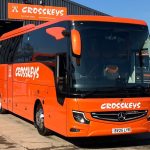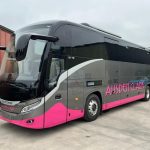With the theme ‘looking after our futures’, the annual CoachMarque conference, the first with over 50 members, held a little about electric coaches and a lot about people
It was a milestone for CoachMarque's annual conference: As Chairman Chris Owens of Alpine Travel pointed out, after years of being “nearly at” 50 members, there are now 51, thanks to newest member Bluebird Coaches of Weymouth.

Airlynx Express and Acklams Coaches have also joined in the last year, and between them the three embody the ethos of CoachMarque and its members: Quality operators striving for professionalism by being part of a recognised industry kitemark.
Dinner and drinks the previous evening at the Radisson Blu Hotel at East Midlands Airport ensured that the conference got off to an informal, genial start, with around 70 attendees.
Ian Luckett, previous Chairman, spoke first about CoachMarque's continuing battle to raise its profile and that of the industry. He said: “It's up to you as operators to push it, otherwise no one will know about it.”
As the Confederation of Passenger Transport (CPT)'s President for 2017, top of Ian's agenda will be to push the importance of the coach sector within the wider industry and to stakeholders. “It's really important that we just keep banging the drum,” he says. “We're part of the solution, not part of the problem.”
Manage managers
The next speaker was Martin-Christian Kent from People 1st, who spoke at the CPT's Coaching Conference last month. He added to that presentation, talking about proactively planning your workforce, rather than reactively trying to deal with staff problems.
The fundamental questions to ask yourself are: How many people do I need? Do they have the required skills? Which staff will be here in five years' time – and which do I not want to have in five years' time?
Managers are a huge problem in staff retention. “The number one reason staff leave is poor management,” says Martin-Christian. “It's because they don’t have a link with the manager, they’re not being treated fairly or getting support. Are you providing first-level manager support?”
Speaking next were Kevin Hull and Chris Clark from financial advisors Premier Plus, on succession and wealth management planning. They talked about how important it is to plan your business’s future in case of your death: Otherwise you risk leaving your spouse and/or children with a business they can’t sell, or leaving your business partner subject to the control of your family.
Nick Greenfield, Head of Tour Operator Relations at the European Tourism Association (ETOA), highlighted those cities in Europe that are good and bad at welcoming coaches – Stockholm is top of the list for the former, and Rome for the latter.
He also talked about coach tourism trends and opportunities, such as experiential travel; the problem of ‘anti-tourism’; and Amsterdam’s method of moving tourists out of the heart of the city by promoting other districts.
Paul McJannett, Development Director of Distinctive Systems, also gave a presentation on the company’s latest updates, including to its Walk-Around Check mobile app.
Electric coaching
BYD is hoping to gain operator feedback on the means and ways of introducing electric coaches into the UK market, and Technical Manager Mike Kerslake addressed delegates with the challenges and benefits.
BYD has partnered successfully with ADL on buses in the UK, and hopes to find a coach body partner in the future.
It revealed its first electric coach, the C9, at IAA in Hanover in 2016. For now, BYD is heralding the coach's suitability to sightseeing and shuttle work, with a range of 200-300km between charges – but that will only improve, as batteries are developed; energy efficiency is increasing about 10% every year, and the cost is coming down.
As well as the big obvious benefit of being zero-emission, electric coaches have lower energy costs: As low as 5-10p/km.
They have a low CO2 footprint that will get lower as the grid “greens up” over the next few decades.
The big challenge for operators is the limited range; fine if it's a city bus with easy access to charging infrastructure, but more difficult for coaches travelling hundreds of miles from home.
Chicken and egg
The lack of infrastructure is a chicken-and-egg problem: Why would operators run electric coaches that they can't charge? And why would anyone build infrastructure if there are no coaches to use it?

Should the industry wait for local or central government to force the issue?
Mike went through various charging strategies, including a commuter coach that's parked up and charging during the day; a schools vehicle on other work during the day; an inter-city express route; and a day excursion. All but the first require charging away from the depot.
There is no easy answer, but several possibilities. Could cities and destinations be persuaded to install the infrastructure? Could bus depot chargers be used by coach operators during the day?
Mike also asked the question: “What will your fleet look like in 10 years' time?”
“Electrification is going to happen,” he says. “We don't know when or how quickly, but it will happen at some point.”
London is the leader of electric vehicles in European cities, helped by the franchise model, which gives operators clear visibility on the return on investment, says Mike.
Why motivate?
Motivational speaker Andrew McMillan played a clip from a Royle Family Christmas special. “If you were going to wet yourself anywhere, you'd wet yourself in John Lewis,” says Barbara Royle. “That's the proudest moment in my 28-year career,” says Andrew.
Andrew spent almost three decades at John Lewis, the last eight years with responsibility for customer service across the brand.

He talked about the “halo effect” of great customer service from one individual, and how it can stay with the customer. If almost 100% of customer experiences are as good as that, the halo effect applies to the brand as well.
Andrew believes to motivate anyone they need to know what they’re being motivated to do – there has to be a ‘why’, and that should be at the heart of your brand.
Through his presentation he highlighted the advertising campaigns of Virgin. He played two of their big-budget TV adverts – neither of which mentioned their routes or fares, but concentrated on the feeling of the brand.
He mentioned the case of the trainspotter who waited hours to see the Flying Scotsman last year, only to have the shot ‘photobombed’ by a passing Virgin train; within 45 minutes of tweeting about it, Virgin offered him a free trip to Atlanta as apology. “Even at customer-focused John Lewis, it would take more than 45 minutes to authorise that,” he said.
He compared it to Ryanair, which is a good business, he said, because it knows exactly what it’s doing, and why it’s doing it. It doesn’t have Virgin’s customer focus and sense of fun, but it has a strong focus.
Chase the intangible
He talked about what makes a business special. Making sure your processes are really good, and your health and safety and compliance top-notch, is not enough – these are ‘tangible’ differentials, but it’s the intangible differentials that make the business special. “If you can upgrade all your vehicles, your neighbour coach company can do the same,” he says. “But if your people are different, it’s something your competitor can’t copy so easily.”

What does your business feel like? “Is your driver happy? Enthusiastic? Or just sat behind the wheel? There’s a big difference.”
To change a business’s culture takes leadership from the top, and he talked at length about the importance of reflecting the culture. He showed a video of Richard Branson clowning around and having fun, then asserted that Richard Branson isn’t naturally like that – he’s quiet and thoughtful, but he acts like that to promote the culture of Virgin’s brand.
It doesn’t just apply to the person at the very top, but middle managers too: 65% of people would choose a new manager over a pay rise, reflecting that only one in 10 managers have the disposition to be a good leader.
He also talked about promoting fun within the business. He demonstrated by getting four people to the front of the room, making them think they would have to do a Full Monty-esque strip, then making them hula-hoop instead. His next game saw the whole room throwing beach balls around; his point was that there are ways to have fun that make some people uncomfortable, and others ways that get everyone involved.
























